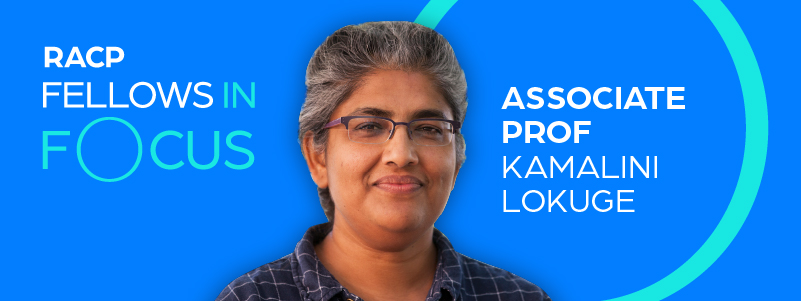RACP Fellows in Focus: A/Prof Kamalini Lokuge
Date published:
24 Feb 2022

"I didn't actually aim to become a specialist,” Associate Professor Kamalini Lokuge explained to us when we asked her about her pathway in public health.
“I started life as a medical doctor and had no understanding of public health during my training in Australia. However, I ended up with Doctors without Borders and went to Afghanistan. My first mission was in 1996, just a couple of weeks after the Taliban had taken over. And was on that first day that I thought, “I’m going to need more than this!”
“After that mission, I decided I needed to understand public health because even if I were able to give the best care and treatment, patients didn’t want to get sick in the first place. I couldn't do that just with clinical skills. I needed to understand preventative public health.”
“As a medical practitioner and specialist, you have a lot of power. People trust their doctors, right? And part of doing the right thing by patients is not just to provide clinical care, it’s examining the drivers that have caused this person to end up in front of me. What can I do to prevent that from happening?”
As well as being a public health physician, Kamalini is a medical epidemiologist and has worked for Médecins Sans Frontières, the World Health Organisation and the International Committee of the Red Cross and responded to a wide range of humanitarian emergencies. She advised State and Federal governments on their responses to COVID-19 and was a member of Australia’s National COVID-19 Health and Research Advisory Committee from its inception until she stepped down in October 2021.
The biggest challenges of her role are what she describes as “injustices and inequalities” when it comes to access to healthcare. Those who inspire her most are her colleagues and patients. Describing an Ebola outbreak in Uganda she explained,
“Most of the senior health staff had either died or left because they were scared, but two staff remained. One of whom was a young nurse, maybe 19 years old, who had just finished her nursing training. To me, it was remarkable that she decided to stay. She remained throughout the three months of the outbreak and worked long hours. Her family had kicked her out because they were worried she'd bring Ebola to their home. When I asked her why she had stayed on when others left she told me she knew help would come and it was important that when it did come, we would see that there were people from our community who had stayed.”
With an impressive array of experience and qualifications, Kamalini’s career pathway would undoubtedly appeal to future Fellows. For those with aspirations, she had some important words of advice,
“Take risks. It's taking what people consider as a risk that may not align with long-term financial security or progression in a particular career path. It's making values-based decisions where you can see that you can make a difference.”
“I think I have the best job in the world, I am really lucky to feel that everything I do is meaningful, and I work with people who share my values. I think I got to that position by, when I had to make decisions, choosing what I thought would be most personally rewarding, but not necessarily materially.”